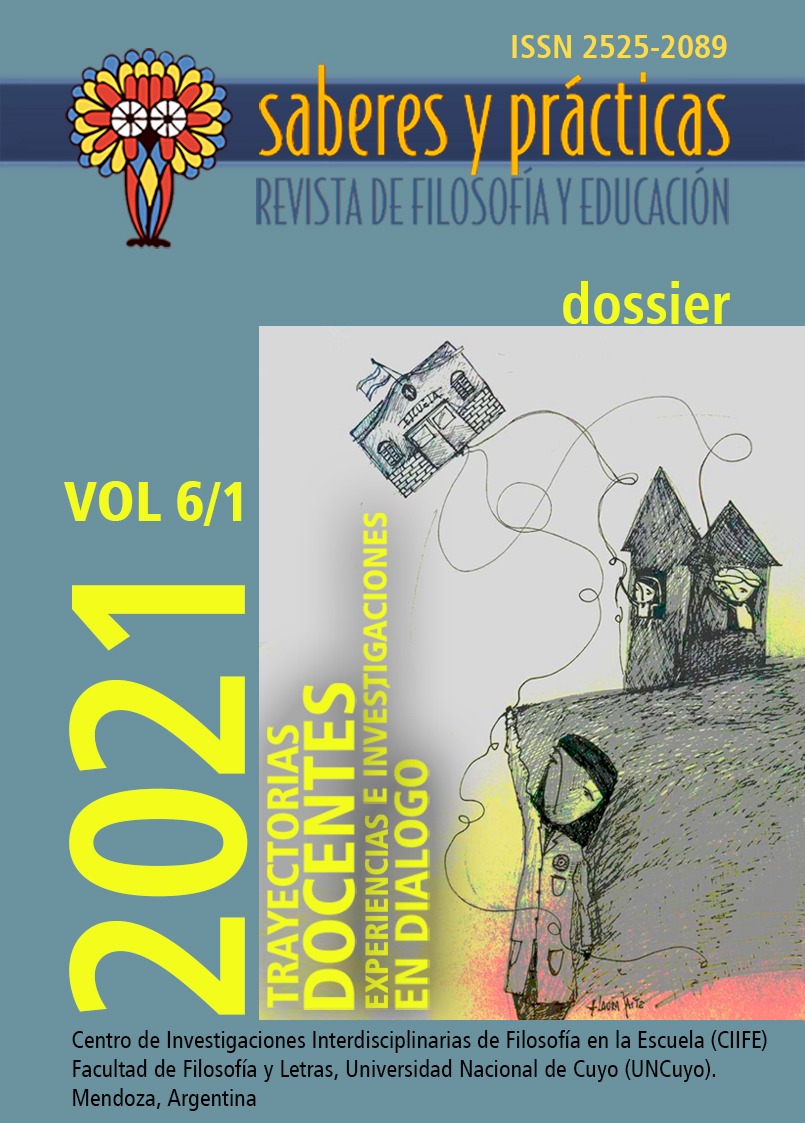Neopragmatismo y educación
Acerca del abordaje inferencialista del aprendizaje
DOI:
https://doi.org/10.48162/rev.36.005Palabras clave:
Neopragmatismo, aprendizaje, inferencialismo, Derry, BrandomResumen
En este artículo examinamos el "abordaje inferencialista del aprendizaje" propuesto por la filósofa de la educación Jan Derry, quien traslada al campo educativo el inferencialismo semántico del filósofo neopragmatista Robert Brandom. Si bien hay elementos que posibilitan esta aplicación, no hay en la literatura (hasta donde sabemos) trabajos que examinen este proyecto. Señalamos dos limitaciones específicas y una general de este enfoque. En cuanto a las limitaciones específicas, el abordaje inferencialista, en primer lugar, ofrece un criterio de posesión de conceptos y esto no es equiparable a un criterio de aprendizaje; en segundo lugar, la indispensable dimensión práctico-política del aprendizaje está completamente ausente en este enfoque. La limitación general, en tanto, se vincula a la preeminencia del lenguaje por sobre la experiencia como rasgo central de diversos neopragmatismos contemporáneos.
Descargas
Citas
Alexander, T. (2013). Eco-Ontology and the Aesthetics of Existence. Fordham University Press.
Bakhurst, D. (2011). The formation of the reason. Wiley-Blackwell.
Baquero, R. (2017). Desarrollo subjetivo, prácticas educativas y prácticas escolares. Los enfoques socioculturales como herramienta de análisis. Revista de Didáctica. Psicología Pedagógica Uberlândia, 1(2), 291-309.
Berstein, R. (2013). El giro pragmático. Siglo XXI.
Brandom, R. (2011). Perspectives on Pragmatism. Classical, recent and Contemporary. Harvard University Press.
Brandom, R. (2005) Hacerlo explícito. Herder.
Brandom, R. (2002). La articulación de las razones. Siglo, XXI.
Del Castillo, R. (2014). L’illusione dell’educazione. Richard Rorty e la crudeltà, di nuovo”. La formacione e il carattere pratico della realta. Scenari e contesti di una pedagogia in situazione. Pedagogie e didattiche. 35, 85-123.
Derry, J. (14 de Junio 2007). Abstract rationality in education. From Vigotsky to Brandom. Stud Philos Educ (27), 49–62. https://doi.org/DOI 10.1007/s11217-007-9047-1
Derry, J. (2013). Can Inferentialism Contribute to Social Epistemology? Journal of Philosophy of Education (47) 222–235. https://doi.org/10.1111/1467-9752.12032
Derry, J. (2017). An Introduction to Inferentialism in Mathematics Education, Mathematics Education Research Journal, (29) 403–418. https://doi.org/10.1007/s13394-017-0193-7.
Derry, J. (2018). Knowledge in education. Why Philosophy Matters. UCL Institute of Education Press. Professorial Lecture Series.
Dewey, J. (1998 [1916]) Democracia y educación. (Trad: Lorenzo Luzuriaga) Morata.
Dewey, John (1933) How we think, revised edition. The later works of John Dewey, 1925-1953. Vol 8. Essays, How we think, revised edition, Southern Illinois University Press.
Faerna, A. On Norms and Social Practices: Brandom, Dewey, and the Demarcation Question. (Verano, 2014), Transactions of the Charles S. Peirce Society, 50 (3), 360-372. https://doi.org/10.2979/trancharpeirsoc.50.3.360
Faerna, A. (1996). Una introducción a la teoría del conocimiento pragmatista. Siglo XXI.
Haack, S. (Junio 2010). “Seis signos de Cientismo”. Discusiones Filosóficas. 11 (16),13-40.
Habermas, J. (2000). From Kant to Hegel: On Robert Brandom's Pragmatic Philosophy of Language. European Journal of Philosophy. 8 (3), 322-355.
Honneth, A. (diciembre 2013). La educación y el espacio público democrático. Un capítulo descuidado en la Filosofía política”. Isegoria. 49, 377-395. https://doi.org/doi:10.3989/isegoria.2013.049.01
Jay, M. (2005). Songs of experience. Modern American and European variations on a universal theme. University of California Press.
McDowell, J. (1994/6). Mind and World. Harvard University Press.
Maher, C. (2013). The Pittsburgh school of philosophy. Routledge.
Marabini, A. Moretti, L. (2017) Assesing concept possession as an explicit social practice. Journal of Philosophy of Education, 51 (4), 801-816. https://doi.org/10.1111/1467-9752.12265.
Nussbaum, M. (2010). Sin fines de lucro. Por qué la democracia necesita de las humanidades. Katz.
Oliverio, Stefano (2020). Dead-ending philosophy? On Rorty’s Literary Culture, Democratic Ethos and Political Education. European Journal of Pragmatism and American Philosophy, Vol. XII (1), 1-23. https://doi.org/DOI: 10.4000/ejpap.1897
Oliverio, Stefano (2018). Pragmatism and Its Aftermath. in P. Smeyers (ed.), Springer. International Handbook of Philosophy of Education, (pp. 609-27) Springer.
Rorty, R. (1999). Education as socialization and as individualization. In R. Rorty (Ed.), Philosophy and social hope (pp. 114–126). Penguin Books.
Rorty, R. (1998). El giro lingüístico. Paidós.
Rorty, R. (1997). ¿Esperanza o Conocimiento? Una introducción al pragmatismo. FCE.
Rorty, R., & Ghiraldelli, P., Jr. (2008). Richard Rorty and philosophy of education: Questions and responses. In M. Taylor, H. Schreier, & P. Ghiraldelli Jr. (eds) Pragmatism, education and children (185-190) Rodopi.
Rorty, R. (1990a). The danger of over-philosophication: Reply to Arcilla and Nicholson. Educational Theory, 40(1), 41–44.
Rorty, R. (1990b). Education without dogma. Dialogue, 2, 44–47.
Rorty, R. (1982). Hermeneutics, general studies, and teaching. Synergos, 2, 1–15
Rorty, R. (1979). Philosophy and the Mirror of Nature. Princeton University Press.
Rorty, R. (1982a). Consequences of Pragmatism. University of Minnesota Press.
Publicado
Cómo citar
Número
Sección
Licencia
Licencia
Esta obra está bajo una Licencia Creative Commons Atribución-NoComercial-CompartirIgual 2.5 Argentina.
Los/as autores/as que publican en esta revista están de acuerdo con los siguientes términos:
1. Los/as autores conservan los derechos de autor y garantizan a la revista el derecho de ser la primera publicaci´´ón del trabajo bajo una licecncia Creative Commons Atribución-NoComercial-CompartirIgual 2.5 Argentina . Por esto pueden compartir el trabajo con la referencia explícita de la publicación original en esta revista.
2. Saberes y prácticas permite y anima a los autores a difundir la publicación realizada electrónicamente, a través de su enlace y/o de la versión postprint del archivo descargado de forma independiente.


































